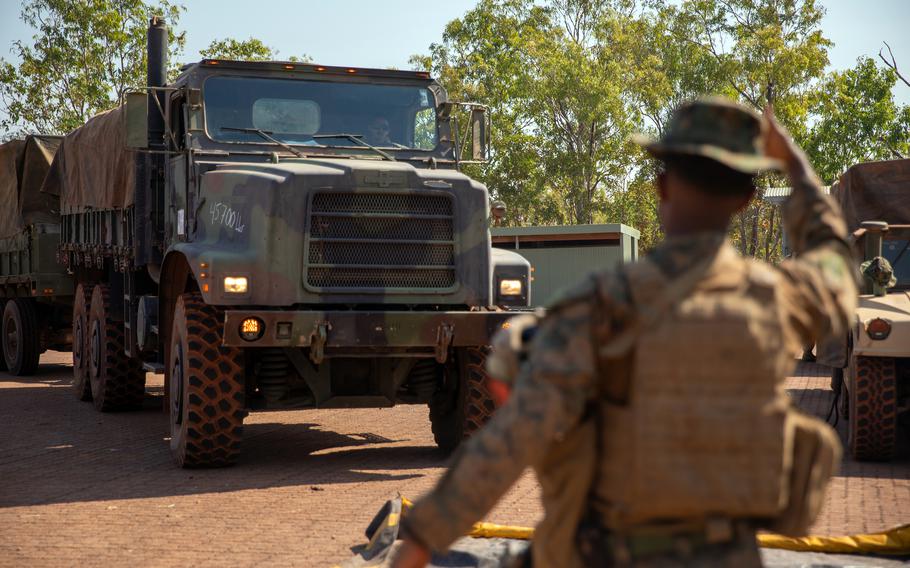
Lance Cpl. Brooke Adamassu, a motor vehicle operator with Combat Logistics Battalion 5 (Reinforced), Marine Rotational Force – Darwin, guides a 7-ton truck during the Predator’s Run exercise at Mount Bundey Training Area, Australia, July 15, 2024. (Migel Reynosa/U.S. Marine Corps)
MOUNT BUNDEY TRAINING AREA, Australia — U.S. Marines transformed a clearing at this remote training area into a field hospital complete with an operating room and intensive care unit during ongoing drills with their Australian counterparts.
Marine Rotational Force – Darwin is conducting Predator’s Run, a 25-day littoral combat exercise alongside troops from Australia, the Philippines and the United Kingdom in Australia’s Northern Territory.
The training focuses on skills needed to operate in or near coastal areas and involves 4,000 troops, including 1,400 Marines. The exercise concludes Aug. 8.
Nine tents, barely visible in the darkness Wednesday night beside a helicopter landing area, formed a Role 2 field hospital staffed by 70 Marines and sailors from Combat Logistics Battalion 5 (Reinforced).
Role 2 facilities provide advanced trauma management, emergency surgery and resuscitative care, according to the Military Health System’s official website.
Earlier, hospital staff practiced treating everything from collapsed lungs to amputated limbs on 18 role players, Navy Lt. Juan Quezada, a nurse at the field hospital, told Stars and Stripes that evening.
They also tended to a real-world injury – a Marine was hurt while riding in a vehicle that encountered rough ground, he said.
“The Marine had a minor shoulder injury, was assessed, and was immediately treated and returned to training,” Capt. Madison Reynolds, a spokeswoman for the rotational force, said by email Monday. “He has made a full recovery.”
The field hospital can stabilize a patient for transfer to Royal Darwin Hospital, 80 miles northwest of the training area, Quezada said.
The Marines’ contract with CareFlight, an Australian aeromedical charity, to perform the mission, he added.
“We do damage control resuscitation and damage control surgery,” Quezada said of the field hospital.
The facility includes an operating room in a tent filled with medical equipment and supplies called a forward resuscitative suite. It’s staffed by general and orthopedic surgeons and an anesthesiologist, Quezada said while standing in the tent.
“We have a shock trauma platoon which is the equivalent of an [emergency room],” he said.
The platoon includes two physicians, a nurse, a physician’s assistant and 17 corpsmen, Quezada said.
The field hospital also has an area called “holding” that’s equivalent to an intensive care ward. It’s staffed by a doctor, nurse and six to eight corpsmen. Injured or ill troops can receive care there for up to 72 hours, Quezada said.
There’s also a tent staffed by a dentist and two technicians to keep the Marines’ teeth in good shape, he said.